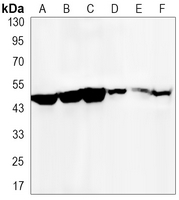Product Name :
KIM1 Rabbit monoclonal antibody Background :
T cell Ig- and mucin-domain-containing molecules (TIMs) are a family of transmembrane proteins expressed by various immune cells. TIM-1 (HAVCR1 (hepatitis A virus cellular receptor 1), KIM-1 (kidney injury molecule-1) was originally identified as a receptor for hepatitis A virus. TIM-1 also acts as a costimulatory receptor on T cells and following activation, associates with the TCR complex to upregulate signaling and cytokine production . Another TIM family member, TIM-4, is expressed by antigen presenting cells and is a ligand for TIM-1 . TIM-1 expressed by Th1 and Th17 cells was also recently shown to interact with P-selectin to mediate T cell trafficking during inflammation and autoimmune disease . NKT cells also express TIM-1, and engagement of TIM-1 on NKT cells leads to increased production of IL-4, but decreased production of IFN-gamma. TIM-1 is also a receptor for phosphatidylserine exposed by cells undergoing apoptosis. Detection of phosphatidylserine by TIM-1 expressed on NKT cells results in activation, proliferation, and cytokine production. Expression of TIM-1 on regulatory B cells is required for optimal production of IL-10. Mice lacking the TIM-1 mucin domain have decreased production of IL-10 by regulatory B cells, hyperactive T cells, increased levels of inflammatory cytokines, and enhanced severity of autoimmune disease. In addition, TIM-1 polymorphisms are associated with susceptibility to atopic diseases including asthma . Finally, expression of TIM-1 is increased in renal tubular epithelial cells following kidney injury. Product :
Liquid in 50mM Tris-Glycine (pH 7.4), 0.15M NaCl, 50% Glycerol, 0.01% Sodium azide and 0.05% BSA. Storage&Stability :
Store at 4°C short term. Aliquot and store at -20°C long term. Avoid freeze-thaw cycles. Specificity :
Recognizes endogenous levels of KIM1 protein. Immunogen :
A synthetic peptide of human TIM 1 Conjugate :
Unconjugated Modification :
Unmodification
KIM1 Rabbit monoclonal antibody Background :
T cell Ig- and mucin-domain-containing molecules (TIMs) are a family of transmembrane proteins expressed by various immune cells. TIM-1 (HAVCR1 (hepatitis A virus cellular receptor 1), KIM-1 (kidney injury molecule-1) was originally identified as a receptor for hepatitis A virus. TIM-1 also acts as a costimulatory receptor on T cells and following activation, associates with the TCR complex to upregulate signaling and cytokine production . Another TIM family member, TIM-4, is expressed by antigen presenting cells and is a ligand for TIM-1 . TIM-1 expressed by Th1 and Th17 cells was also recently shown to interact with P-selectin to mediate T cell trafficking during inflammation and autoimmune disease . NKT cells also express TIM-1, and engagement of TIM-1 on NKT cells leads to increased production of IL-4, but decreased production of IFN-gamma. TIM-1 is also a receptor for phosphatidylserine exposed by cells undergoing apoptosis. Detection of phosphatidylserine by TIM-1 expressed on NKT cells results in activation, proliferation, and cytokine production. Expression of TIM-1 on regulatory B cells is required for optimal production of IL-10. Mice lacking the TIM-1 mucin domain have decreased production of IL-10 by regulatory B cells, hyperactive T cells, increased levels of inflammatory cytokines, and enhanced severity of autoimmune disease. In addition, TIM-1 polymorphisms are associated with susceptibility to atopic diseases including asthma . Finally, expression of TIM-1 is increased in renal tubular epithelial cells following kidney injury. Product :
Liquid in 50mM Tris-Glycine (pH 7.4), 0.15M NaCl, 50% Glycerol, 0.01% Sodium azide and 0.05% BSA. Storage&Stability :
Store at 4°C short term. Aliquot and store at -20°C long term. Avoid freeze-thaw cycles. Specificity :
Recognizes endogenous levels of KIM1 protein. Immunogen :
A synthetic peptide of human TIM 1 Conjugate :
Unconjugated Modification :
Unmodification
-
 Western blot analysis of KIM1 expression in A549 (A), MCF7 (B), U251 (C), HL60 (D), Raw264.7 (E), PC12 (F) whole cell lysates.
Western blot analysis of KIM1 expression in A549 (A), MCF7 (B), U251 (C), HL60 (D), Raw264.7 (E), PC12 (F) whole cell lysates.
Bioworld Biotech only provide peptides for our antibodies and do not provide additional peptide customization services.
Price/Size :
USD 368/1mg/vial
Tips:
For phospho antibody, we provide phospho peptide(0.5mg) and non-phospho peptide(0.5mg).Describe :
Blocking peptides are peptides that bind specifically to the target antibody and block antibody binding. These peptide usually contains the epitope recognized by the antibody. Antibodies bound to the blocking peptide no longer bind to the epitope on the target protein. This mechanism is useful when non-specific binding is an issue, for example, in Western blotting (WB) and Immunohistochemistry (IHC). By comparing the staining from the blocked antibody versus the antibody alone, one can see which staining is specific; Specific binding will be absent from the western blot or IHC performed with the neutralized antibody.Formula:
Synthetic peptide was lyophilized with 100% acetonitrile and is supplied as a powder. Reconstitute with 0.1 ml DI water for a final concentration of 10 mg/ml.The purity is >90%,tested by HPLC and MS.
Storage:
The freeze-dried powder is more stable. For short time at 2-8°C. For long term storage store at -20°C.
Note :
This product is for research use only (RUO only). Not for use in diagnostic or therapeutic procedures.
 KIM1 Rabbit monoclonal antibody
KIM1 Rabbit monoclonal antibody  Datasheet
Datasheet COA
COA MSDS
MSDS SHIP
SHIP